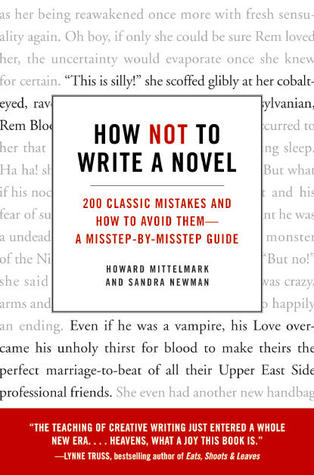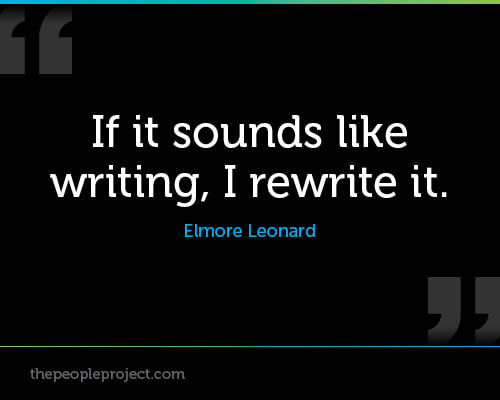
This year, I want to review a wonderful book on writing called “How Not to Write a Novel," by Howard Mittelmark and Sandra Newman. I’ve read this hilarious book several times, and it really gets me thinking about what the best writing tips are. I'm not going to offer the tips the book already discusses, just the thoughts and tips it inspired for me. I'll be giving some extra tips, some ways to fix the common mistakes described in the book (as it doesn't always offer solutions), and very occasionally, some exceptions to the rules.
We'll start where they start: Beginnings.
Several of the ways not to open your story listed in "How Not to Write a Novel" are various forms of the same thing: too much description delaying action. Too much backstory, too much time spent setting the scene, info dumps, etc. When I'm reading a book that doesn't have a strong beginning, it feels like I'm watching the writer warm up.
This is a weird pacing issue I find pretty often in self-published books (and yes, some traditionally published books, too). The beginning, no matter how big or small it may be, is overflowing with description. When very little is going on, it makes the book boring and dragging. When there is action, it’s turned into a weird, slow-motion movie scene, where sometimes it does add drama, but often falls flat. The strangest thing about this is, the pace changes after the first page or so of super drawn-out description.
It’s like the writer is trying to tell the reader, "look at my beautiful writing! I know how to write!" and they do so by attempting to "show off" in an inappropriate place, for example, "watch how beautifully I can describe a character taking a shower!" What's really going on is a desperate attempt to beat the blank page, and that's what shows. Once the story actually gets going, the pace picks up a lot more—again—completely regardless of what’s actually happening.
We'll start where they start: Beginnings.
Several of the ways not to open your story listed in "How Not to Write a Novel" are various forms of the same thing: too much description delaying action. Too much backstory, too much time spent setting the scene, info dumps, etc. When I'm reading a book that doesn't have a strong beginning, it feels like I'm watching the writer warm up.
This is a weird pacing issue I find pretty often in self-published books (and yes, some traditionally published books, too). The beginning, no matter how big or small it may be, is overflowing with description. When very little is going on, it makes the book boring and dragging. When there is action, it’s turned into a weird, slow-motion movie scene, where sometimes it does add drama, but often falls flat. The strangest thing about this is, the pace changes after the first page or so of super drawn-out description.
It’s like the writer is trying to tell the reader, "look at my beautiful writing! I know how to write!" and they do so by attempting to "show off" in an inappropriate place, for example, "watch how beautifully I can describe a character taking a shower!" What's really going on is a desperate attempt to beat the blank page, and that's what shows. Once the story actually gets going, the pace picks up a lot more—again—completely regardless of what’s actually happening.
It makes sense that we, the writers, don’t always hit the ground running with perfect flow. Learn to notice those places where it took you some extra time to find your voice, and smooth them over later. Recognize how you sound when you’re “warming-up” vs when you’re in the middle of a “flow” state. The best way to do this, and to minimize how much time it takes you to “warm-up” is to write more often.
So, are there exceptions to this rule? Maybe you've read books that open with lots of description, and it's praised by your English teachers as beautiful. Personally, I feel like there's nothing more dangerous to young aspiring writers, because they will try desperately to imitate it. Don't fall for it. Did you really enjoy wading through such thick descriptions? Are those really your favorites to read, or were you sitting in class feeling frustrated and bored? Consider your genre, too. Don't compare an old classic work of literary fiction to a modern, young adult fantasy novel. You don't have to "show off" that you know how to write. Sometimes it helps to forget about "writing," and focus on telling the story.
So, are there exceptions to this rule? Maybe you've read books that open with lots of description, and it's praised by your English teachers as beautiful. Personally, I feel like there's nothing more dangerous to young aspiring writers, because they will try desperately to imitate it. Don't fall for it. Did you really enjoy wading through such thick descriptions? Are those really your favorites to read, or were you sitting in class feeling frustrated and bored? Consider your genre, too. Don't compare an old classic work of literary fiction to a modern, young adult fantasy novel. You don't have to "show off" that you know how to write. Sometimes it helps to forget about "writing," and focus on telling the story.

 RSS Feed
RSS Feed
